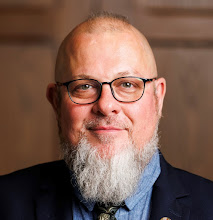 |
| Marcel Duchamp's Fountain at Tate Modern. [Public Domain, photo by David Shankbone, London]. |
 The Plague by Albert Camus
The Plague by Albert CamusMy rating: 5 of 5 stars
This literary work by Albert Camus might be rewarding if read simply as a novel. But to comprehend the work in the context of his philosophical "book-length essays", The Myth of Sisyphus and The Rebel (which I am yet to read), and his other famous novel, The Stranger, requires an understanding of Camus' philosophy of the absurd. While Camus refused the label of existentialist philosopher, it is clear that he develops a philosophy of the absurd in the three of the above works I have read thus far.
I suspect that a reading of The Rebel and also Nuptials will provide further insight into his ideas, but much like reading Nietzsche, I think one could develop a sense of Camus' ideas no matter where one starts. I enjoy referring to the Stanford Encyclopedia of Philosophy when trying to comprehend philosophical works, but I follow Mortimer Adler's advice to read the work first, so as to form my own impression, before immersing myself in the interpretations of others'. This particular edition of the novel is helpful in that it contains an afterword, rather than an introduction, by the late Professor Tony Judt.
Whenever I think of absurdity, I tend to think of the Dada Movement. But the ridiculousness of Dada served the purpose of mocking the bourgeois, so it does not relate so much to the absurd in the philosophical sense as it does "absurd" in the sense of "ridiculous". What I gather from my reading is that the absurd relates to the absence of any meaning of life. It is irrational in that you cannot reach, by reason, the meaning of life other than that you live and then you die.
There is an element of Nietzsche's "God is dead", too, in that Camus attacks religion, no, challenges religion, in its attempt to provide meaning to life (or the after-life). As the title suggests, this novel is a fictional story about the plague striking Oran, Algeria, and the lives of a group of men who are caught up by the inevitable quarantining of the city. In his afterword, Tony Judt tells of how Camus relied on his personal experience of Nazi-occupied France (Camus was a reluctant hero of the French Resistance) as a basis for his story, and how as soon as the tragedy is over, people simply pick up from where they left off and seem to forget the lessons learnt from the trauma.
Without giving too much of the plot away, nor the interesting use of the narrator, the non-religious protagonist simply does his duty. In doing so, we see a human Sisyphus at work. It probably didn't help being sick myself while reading this, and wondering if each time one of the pets scratched themselves I might be in for a dose of the plague, but like all of Camus' work I have read thus far, it leaves me with a strange sense of resignation. I was going to say hope, but this is where Camus disagreed with Sartre and the existentialists: he saw them as "deifying" the knowledge that there was no god (or God or gods), and turning existentialism into its own form of religion, much like the anti-religionist non-scientist science-lovers do on social media these days.
Something that strikes me with Camus is the absence of hope. If one doesn't like it, then one can always end it. And here I draw parallels with the Stoics. There is always that macabre option. But if we choose to live, we can only live for the present moment. What appears again and again in The Plague is a sense of duty. Not so much for a cause, but to do what one does because that is what one does. To live in the present moment, for the future is death, and the past is beyond our control.
Yet this doesn't mean we adopt a hedonistic approach to life, but rather that we do our duty, in accordance with our nature. Of course, these ideas are difficult to comprehend without a thorough reading of Camus, Nietzsche, and the Stoics; even so, it is still difficult to articulate the concept. Camus' use of the novel to explain these concepts is powerful, in that through metaphor, we can come to understand his non-philosophical philosophy.
Rather than attempting to find meaning in life (which is absurd because there is none), we can exist in the present moment and do our duty. And while this may sound nihilistic, there is a sense of peace one can gain by acknowledging that all we can control are our impressions of external events, and then how we react to the things we cannot control. As Camus observed in The Myth of Sisyphus (p. 64):
...integrity has no need of rules.
It would seem that there is some relation to Stoicism, in that personal decision and choice is a central theme.
But that is just my take on it. If you would rather just read an excellent novel, then this is it. If, of course, you can not wonder about the absurdity of it all after reading it.
 Donate
Donate






.jpg)


 The Political Flâneur: A Different Point of View
The Political Flâneur: A Different Point of View